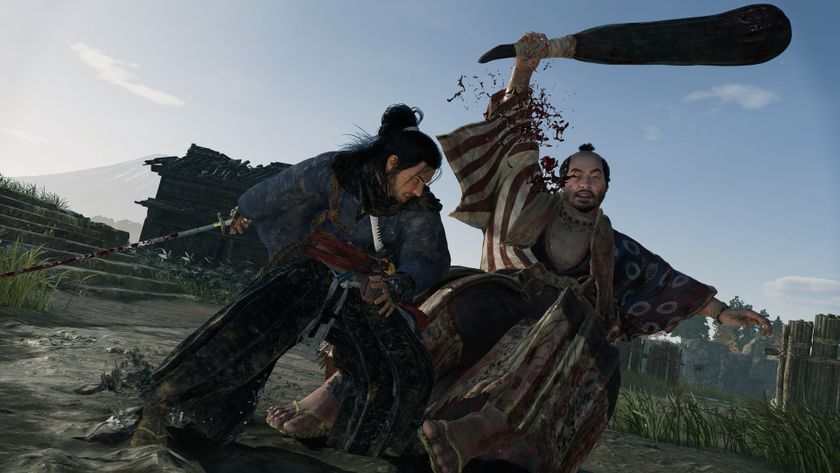The older generation still doesn't 'get' games, and that needs to change
Of all the animals to lend their names to the English language, it is perhaps the goat that gets our shortest shrift. This poor beast has been used to denote everything from mild annoyance - i.e. 'getting my goat' to the particular perversions of a randy old man - or 'old goat'. Then of course, there's 'scapegoating'. Named for the ancient practice of substituting a goat for all of a community's sins, scapegoating represents the blame game at its most utterly, witlessly contrived.

So, how does all of this impinge upon video games? Well, let's just put it this way: as far as the mainstream media is concerned gaming is now that goat. And, in fact, has been for about 30 years. Even today, with games an undeniable mass-market entertainment business, tabloids still ascribe all sorts of nasty behaviours to our interactive medium. Gaming - or so it goes - has created a whole generation of dangerously imbalanced individuals, so much so that no example of 'expert journalism' seems complete without at least a cursory glance towards a young suspect's game collection.Even though they’ve been at this schtick since the first Mortal Kombat, and still have no legitimate case.
'Look here, we've discovered the smoking gun', they seem to bleat - 'it's a copy of CoD 4, fallen down the back of the sofa. It all makes sense now!' Never mind the litany of real-life influences, from untreated mental illness to absent parenting - why tackle those trickier issues when we can simply point a finger and forget about the bigger picture? That dead horse isn’t just going to flog itself, you know. It's not so much that gaming can do no wrong - they and their industry get all kinds of things wrong - rather that these reports often amount to little more than ignorant, demonising hearsay.
Of course, we as players know better than to heed such nonsense, but then this sort of reporting isn't really meant for our eyes, now is it? Statistical evidence demonstrates that the average newspaper and/or tv news viewer is currently in their mid-50s. The representative gamer meanwhile, is a whole lot closer to 30. Like all publications, these mainstream outlets attempt to speak to - and oftentimes reinforce - the perceptions of their core reader base. If they didn't, they'd stand to lose viewers.

That's not to say that these readers are simply allowing themselves to be duped, rather that even with the best will in the world such constant reinforcement of 'known facts' will eventually take its toll. After all, how many similar opinions, presented with an air of confident assurance do we all accept in our day-to-day lives, particularly on topics with which we no personal experience? What we're left with is the prevailing opinion that violence and video games must somehow be related, because if they weren't, why else would we read about it so often?
So that's the situation, but what about the factors that led to this prevailing opinion? Why do folks - predominantly of an older generation - choose to create and accept these game-bashing narratives? The obvious answer is that they simply haven't experienced gaming. After all, the human race is all about fearing the unknown, and nothing stokes ignorance quite like fear. It's a vicious cycle. The less you understand something, the more you distance yourself from it, and then the less you understand it, and so on and so forth. Still, that doesn't quite answer the question of why so few older folks seem have taken up gaming as a hobby.
As entertainment mediums go, gaming is perhaps the only noteworthy example of a format failing to win over its preceding generation. Sure, early film may have had its detractors, but that was never enough to stop scores of adults from flocking to the cinema. And what about TV, and radio, both of which earned audiences amongst those who could comfortably recall a time prior to their invention. What is it about gaming, then that seemingly fails to click?
Sign up to the 12DOVE Newsletter
Weekly digests, tales from the communities you love, and more

Well, for one thing, gaming is the only medium to truly come of age in the 'modern commercialist era.' As such, it was almost immediately defined, marketed and sold to a highly specific audience. Interactive entertainment was labelled a 'game' - a children's toy to be consumed, outgrown and eventually discarded. A person now in their mid-50s might then have been approaching 20 by the time the arcades were beginning to hit their stride. The original NES, meanwhile, wouldn't appear until 1985, by which time our imaginary 50-something would be well into his/or her mid-20s - hardly the time to be indulging in what was then portrayed as a purely infantile pursuit.
Imagine seeing something considered utterly frivolous today being considered an art form 30 or 40 years from now. What if finger painting, for instance went on to become the most successful form of personal expression? I'm willing to bet that no matter what the hip young folks of tomorrow might tell you, you'd still consider it all just a little bit silly. That, in a nutshell is what video games represent to older folks, though it isn't the only factor worth considering.
For their part, video games haven't exactly been all that welcoming to an older audience. Given the rampant success of the 'games as toys' formula, the medium has always seemed just a wee bit too comfortable at playing within these confines. Indeed, one suspects that any recent thematic and mechanical maturation has only come about so as to keep pace with gaming’s original, now 30-to-40-something clientele. Games have grown up pretty much in synch with those who have always played them.

And of course, we shouldn’t discount the fact that games are the only major entertainment medium not to be enjoyed passively. If you want to get something out them, you have to put a fair amount of time and effort in. That being said, if the older generation can master the intricacies of the Internet, then they can surely - with the right encouragement - overcome the complexity of the gamepad (though it also couldn't hurt to see a few more games offer a more streamlined way to play, reducing input down to a bare minimum of buttons, as a standard alternative set-up. Bayonetta’s Automatic Mode is a great innovation, alas rarely repeated).
After all, these are the folks who endured one of the most rapidly shifting eras in all of human history. They've seen numerous, wholesale changes in everything from social convention to fashion, witnessing man step on the moon and technology flourish beyond our wildest imaginations (still no jet packs, mind). Whatever certain snotty young ‘uns might think, there’s no inherent ability-limit holding back older potential players.
Now of course, convincing an older relative to get seriously involved often feels like a lost cause, though that isn't why I term them 'the lost generation'. Rather, I call them that simply - and sadly - because they're the generation that is all too often losing out on the wonderful opportunity to play games, to explore alien vistas or experience bygone eras, to be touched by a poignant piece of interactive narrative or to cut loose on an adrenaline-pumping adventure.

In order to round this out, i'll say this. Experience always trounces ignorance, and like it or not we are the gatekeepers of that experience. If we want to stop the scapegoating of games we have to make an effort to present the medium to the very groups who know so very little about it. To do that we'll need to have sympathy for their circumstances, their viewpoints, and why it is they may never really have wanted to get into games. Hopefully this article has shed some light on the reasons why these folks may or may not choose to play. Can we really open up a world of new experiences to these people - often our dear old mums and dads - and in doing so perhaps aid the perceptions of our own embattled hobby? I believe it's worth a shot. After all, what if it were you unknowingly in their position? Wouldn't you want someone to do the same for you?
















